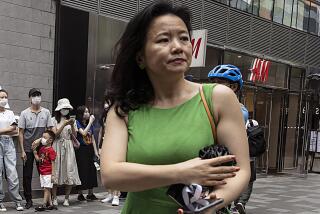Official Upstaged at Seat of Communist Power : Taiwan Newsman Gets China Spotlight
BEIJING — When Pi Chieh-hsing, a journalist from Taiwan, arrived late at a Tuesday morning press conference in the Great Hall of the People, the first thing he did was steal the show.
Pi walked into the second-floor conference room shortly after a top Chinese science official had begun speaking about science and technology to about 200 Chinese and foreign journalists who are covering the 13th National Congress of China’s Communist Party.
His arrival had been expected, and many television crews, photographers and reporters--roughly one-quarter of the journalists present--blithely ignored the speaker and rushed to surround Pi as he took a seat.
After 60 years of hostility between Nationalists and Communists, broken only by a shaky alliance during World War II, a reporter from the Nationalist-ruled island of Taiwan was going about his job in a building that symbolizes Communist power.
Third From Taiwan
Pi was six weeks behind the first journalists from Taiwan to visit Beijing on a reporting trip, but those two reporters, who created an even bigger sensation, had focused on more ordinary aspects of Chinese life. They now face criminal charges in Taiwan.
Pi was the first--and so far the only--reporter from Taiwan to show up in Beijing to accept a general invitation from China for Taiwanese reporters to cover the eight-day party congress.
Taiwan’s government has announced that beginning next month, it will be legal for citizens of Taiwan to visit relatives in mainland China. About 2 million people fled to Taiwan in 1949 when the Nationalist government took refuge there after the Communist victory on the Chinese mainland.
But Pi, who might otherwise qualify for a legal visit because he has relatives in China, came before the new rules go into effect.
‘Fight for My Rights’
Later in the day, Pi held his own press conference before about 75 reporters at the headquarters of the Chinese Journalists Assn., where a special press center has been set up to serve reporters covering the party congress.
“Reporters should not be stopped from coming to China,” Pi said. “I want to fight for my rights.”
Pi, 32, is deputy editor of the World News Agency, a news organization that recently resumed operation after being shut down for one year by Taiwan’s government for carrying articles critical of the Nationalists.
Interior Ministry officials in Taipei said that Pi might be punished by having his permission to travel abroad revoked for two years, according to the Associated Press.
The two reporters from Taiwan who visited China in September, Li Yung-teh and Hsu Lu of the Independence Evening Post, had described Beijing as “a strange and distant city.”
Sees Similarities
But Pi, who arrived in Beijing on Monday after spending four days in southern China, said he was struck by many similarities between mainland China and Taiwan.
There is “a big difference between the systems of the two places” but at a fundamental level “the basic structure of Taiwan and the mainland is the same,” Pi said. “Taiwan people, for example myself, when we come to the mainland, we don’t have a feeling of being in a foreign land.”
Pi said he favors ultimate reunification of Taiwan and the mainland, but that this will take a long time. He also issued an impassioned appeal to Taiwan’s leaders to go beyond the steps they have already taken and allow Taiwan’s businessmen to participate in China’s economic development.
While Beijing has been calling for mail, trade and transportation links with Taiwan, the Nationalists have maintained a policy of “no contact, no compromise and no negotiations.” Officials in Taiwan have insisted that relaxation of the travel ban does not constitute a change in this policy.
But announcement of the new rules has already unleashed growing demands by businessmen for legalization of direct trade, and Pi’s comments reflected this view.
More to Read
Sign up for Essential California
The most important California stories and recommendations in your inbox every morning.
You may occasionally receive promotional content from the Los Angeles Times.










